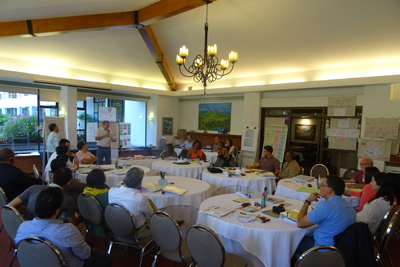REBYC-II LAC trains technicians, researchers and fishermen in the management and implementation of the Ecosystem Approach to Fisheries
- Regional meeting promotes the exchange of experiences, problems and approach of solutions for the different countries that work on the project
- REBYC-II LAC’s steering committee learned about the greatest progress made in Latin American and The Caribbean and approved the work plan proposed for 2018
San Jose, November 2017. Scientists, fishery experts and fisherfolk from the participating countries of the project on Sustainable Management of Bycatch in Latin America and Caribbean Trawl Fisheries (REBYC-II LAC), were trained in the responsible management of shrimp trawl fisheries, based on the Ecosystem Approach of Fisheries (EAF). With this, they are able to create fisheries development plans, which carry out fisheries in a sustainable way and with technical criteria, according to the specific ecosystems of the countries.
 |
| EAF workshop in Costa Rica © FAO Costa Rica |
During the workshop held in Costa Rica, which was facilitated by FAO in coordination with the Costa Rican Institute of Fisheries and Aquaculture (INCOPESCA), the representatives of Brazil, Colombia, Costa Rica, Mexico, Suriname, and Trinidad and Tobago, agreed that they have the common challenge of reducing the impact of trawling, and transforming it into a responsible, sustainable activity with highly qualified human capital in ecosystem behavior. Therefore, through this theoretical learning, the participants will be able to make decisions and generate proposals regarding fisheries development, inter/intra sectoral planning, food health products and labor sustainability, among others.
“The Ecosystem Approach to Fisheries allows us to integrate the technical aspect of sustainability on which REBYC is based, with the socioeconomic and governance aspect to strengthen not only the fishery as such, but also the human and community knowledge about what they can and must do in the right way to strengthen their income in a sustainable way” said Carlos Fuentevilla, regional coordinator of the REBYC-II LAC project.
The synergy and feedback that has been generated throughout the training process, allows participants to find joint ideas to solve the challenges that they have in each of their countries and generate a process of support and holistic sustainability in fisheries, which works as an example for the rest of the world.
The countries participating in the REBYC have taken gigantic strides in the implementation of the project, said Daniela Kalikoski, FAO fisheries officer and lead technical officer of the REBYC-II LAC, since they have managed to appeal to the trawling sector to generate awareness of the need to use technologies to reduce bycatch and discards to ensure the continuity of the species that make up the shrimp bycatch, and of course, achieve the sustainable use of the resource.
“The implementation of the REBYC project is not simple, that is clear to us. However, when the participating countries managed to capture the attention of the sectors and fisheries, they paved the road to move ahead. REBYC is moving forward and is generating change, first in the mindset that is where we should start and then in the practices that are the cornerstone of the success of the project” said Kalikoski.
Both Fuentevilla and Kalikoski agree that REBYC and the EAF could, in theory, have within their guidelines the solutions to all the problems in the fisheries. But if the fisherfolk, producers and the authorities themselves are not aware of accepting, which is necessary to generate change and direct the wheel towards sustainability, nothing will be possible.
This training was also attended by fisherfolk and owners of artisanal and semi-industrial vessels for shrimp fishing. They received lessons on how to generate an ecosystem management plan and cooperation between fisheries and authorities to generate convergence of actions.
“This workshop teaches us how we can and should act together with the authorities and experts to create management plans and sustainability in fisheries, in order to reduce the impacts on this activity and ensure that we always have products. Also to give the fisherfolk and the entire productive chain the rights they deserve for their work” said Rolando Ramirez, a Costa Rican artisanal fisherman.
Success stories
REBYC has already documented successful cases in which it has been a participant, as in the case of Suriname, which is a large producer and exporter of the shrimp popularly called Seabob (Xiphopenaeus kroyeri) and needed to keep the European market, who demanded sustainability certifications. Therefore, the shrimp trawling fisheries sector organized and began to search for the international certification of its fishery through the Marine Stewardship Council (MSC) system.
The MSC is a certification program that offers fisheries sustainability tools that allow them to be competitive in the international markets, while provide them with inputs to order and improve their capture practices of the target species.
Thanks to the recommendations given by the program and the compliance of the Suriname fisheries sector, the Seabob shrimp fishery managed to conserve the European market. In addition to this, REBYC has been a participant in this process by advising and facilitating the necessary technologies for compliance with the sustainability criteria established by the MSC and continues to support fishermen in education on ecosystem behavior.
In Central America, Costa Rica has also made important progress, such as the Marine Spatial Zoning Map for the sustainable use of shrimp, a cartographic document that allowed defining the marine spaces in which the fishing fleets can do their work and in those in which it is prohibited to enter, because they are areas of conservation or research. In addition, this work made possible it to generate a balance between semi-industrial trawling and artisanal fishing, since it has established the work spaces of each one.
This document was generated thanks to a process of active dialogue in Costa Rica involving various state bodies, civil society and members of various fishing sectors.
